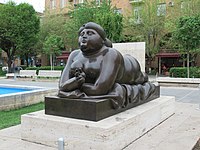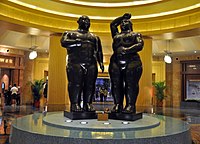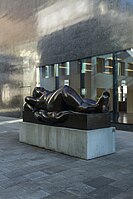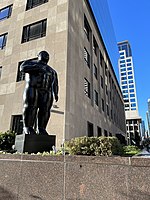Fernando Botero
Fernando Botero | |
|---|---|
 Botero in 2018 | |
| Born | Fernando Botero Angulo[1] 19 April 1932 Medellín, Colombia |
| Died | 15 September 2023 (aged 91) Monte Carlo, Monaco |
| Known for |
|
| Notable work |
|
| Spouse | |
| Children | 4, Lina, Juan Carlos, Fernando and Pedro (Died. 1974[2]) |
| Website | botero.org |
| Signature | |
 | |
Fernando Botero Angulo (19 April 1932 – 15 September 2023)[3] was a Colombian figurative artist and sculptor.[4] His signature style, also known as "Boterismo", depicts people and figures in large, exaggerated volume, which can represent political criticism or humor, depending on the piece. He was considered the most recognized and quoted artist from Latin America in his lifetime,[5][6][7] and his art can be found in highly visible places around the world, such as Park Avenue in New York City and the Champs-Élysées in Paris, at different times.[8]
Self-styled "the most Colombian of Colombian artists",[9] Botero came to national prominence when he won the first prize at the Salón de Artistas Colombianos in 1958. He began creating sculptures after moving to Paris in 1973, achieving international recognition with exhibitions around the world by the 1990s.[10][11] His art is collected by many major international museums, corporations, and private collectors, sometimes selling for millions of dollars.[12] In 2012, he received the International Sculpture Center's Lifetime Achievement in Contemporary Sculpture Award.[13]
Biography[edit]
Early life[edit]
Fernando Botero was born in Medellín on 19 April 1932.[14] His father, David Botero, [15] a salesman who traveled by horseback, died when Fernando was four.[3] His mother, Flora Angulo, [16] worked as a seamstress to support the family.[3] An uncle took a major role in his life.[3] Although isolated from art as presented in museums and other cultural institutes, Botero was influenced by the Baroque style of the colonial churches and the city life of Medellín while growing up.[17]
Botero received his primary education at the Ateneo Antioqueño and, thanks to a scholarship, he continued his secondary education at the Jesuit School of Bolívar.[18] In 1944, Botero's uncle sent him to a school for matadors for two years.[19] Some of his earlier drawings were inspired by the bullfight scene. He sold his first painting for two pesos, thanks to a merchant who allowed him to display it in the window of his shop.[20][21] He spoke with the Los Angeles Times, during an interview in November 2000, and explained that he lost the money he got for the painting and thus, his brothers never believed him.[22] His love of drawing nudes caused problems with his Roman Catholic education. He was expelled from school after defending Pablo Picasso’s art in an essay. [21] In 1948, Botero at the age of 16 had his first illustrations published in the Sunday supplement of El Colombiano, one of the most important newspapers in Medellín. He used the money he was paid to attend high school at the Liceo de Marinilla de Antioquia.[23]
Career[edit]
Botero's work was first exhibited in 1948, in a group show along with other artists from the region.[24] From 1949 to 1950, Botero worked as a set designer, before moving to Bogotá in 1951. Young Botero also worked as a newspaper illustrator to support his artistic interests and before attending San Fernando Academy. The Pérez Art Museum Miami acquired a still life picture of Botero's early days of career depicting apples, an influence of European art historical movements and 20th-century painters.[25] His first one-man show was held at the Galería Leo Matiz in Bogotá, a few months after his arrival.[26]
In 1952, using his gallery earnings, Botero sailed to Europe. He arrived in Barcelona and then moved on to Madrid.[27] In Madrid, Botero studied at the Academia de San Fernando and was a frequent visitor to the Prado Museum, where he copied works by Goya and Velázquez.[28] He sold his copies on the streets to make money.[29]
In 1953, Botero moved to Paris, where he spent most of his time in the Louvre, studying the works there. He lived in Florence from 1953 to 1954, studying the works of Renaissance masters.[24] Later in life, he lived most of the time in Paris, but spent one month a year in his native city of Medellín. He had more than 50 exhibitions in major cities worldwide, and his work commands selling prices in the millions of dollars.[30] In 1958, he won the ninth edition of the Salón de Artistas Colombianos.[31]
Around 1964, Botero made his first attempts to create sculptures.[32] Due to financial constraints preventing him from working with bronze, he made his sculptures with acrylic resin and sawdust. A notable example during this time was Small Head (Bishop) in 1964, a sculpture painted with great realism. The material was too porous, so he abandoned this method.[33] He returned to sculpture "with enthusiasm" in Italy in the mid-1970s and exhibited his characteristic bronze sculptures for the first time at the Grand Palais in Paris in 1977.[32]
On 10 June 1995, while his son Fernando Botero Zea was serving as Minister of Defence, a bomb containing 10 kg of dynamite was placed underneath one of Botero's bronze sculptures on display in Medellín's Plaza San Antonio. The resulting explosion killed 23 people and injured 200 more; the perpetrators were never identified.[34] A horrified Botero decided that the damaged sculpture should be left in place as a "monument to the country's imbecility and criminality" and donated an intact replica to stand alongside it.[35][36]
In 2004, Botero exhibited a series of 27 drawings and 23 paintings dealing with the violence in Colombia from 1999 through 2004. He donated the works to the National Museum of Colombia, where they were first exhibited.[37]
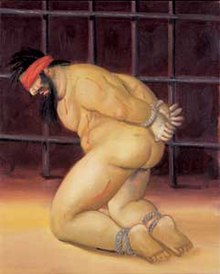
In 2005, Botero gained considerable attention for his Abu Ghraib series, which was exhibited first in Europe. He based the works on reports of United States forces' abuses of prisoners at Abu Ghraib prison during the Iraq War. Beginning with an idea he had had on a plane journey, Botero produced more than 85 paintings and 100 drawings in exploring this concept[38] and "painting out the poison".[30] The series was exhibited at two United States locations in 2007, including Washington, DC. Botero said he would not sell any of the works, but would donate them to museums.[39] In 2009, the Berkeley Art Museum acquired (as a gift from the artist) 56 paintings and drawings from the Abu Ghraib series, which can be seen online.[40] Selections from the series have been regularly included in the museum's annual Art for Human Rights exhibitions.[41]
In 2006, after having focused exclusively on the Abu Ghraib series for over 14 months, Botero returned to the themes of his early life such as the family and motherhood. In his Une Famille[42] Botero represented the Colombian family, a subject often painted in the 1970s and 1980s. In his Maternity,[43] Botero repeated a composition he had already painted in 2003.[44]
In 2008, he exhibited the works of his The Circus collection, featuring 20 works in oil and watercolor. In a 2010 interview, Botero said that he was ready for other subjects: "After all this, I always return to the simplest things: still lifes."[30]
Style[edit]

While his work includes still-lifes and landscapes, Botero concentrated on situational portraiture. His paintings and sculptures are united by their proportionally exaggerated, or "fat" figures, as he once referred to them.[30]
Botero explained his use of these "large people", as they are often called by critics, in the following way:
An artist is attracted to certain kinds of form without knowing why. You adopt a position intuitively; only later do you attempt to rationalize or even justify it.[45][self-published source?]
Botero’s work, Still Life with Mandolin, marked the beginning of his stylistic development in painting enlarged figures. It became his trademark.[46] During a November 2000 interview, he said about it:
I was drawing a mandolin, and I made the sound hole very small, which made the mandolin look gigantic. I saw that making the details small made the form monumental. So, in my figures, the eyes, the mouth are all small and the exterior form is huge.[47]
During 1956 – 1958, Botero had exhibitions in both Washington D.C. and Mexico City. Despite selling almost all of his paintings, he didn't gain favor of critics. His reputation improved after the New York Museum of Modern Art obtained his painting, Mona Lisa, Age Twelve, in 1961.[46]
Though he spent only one month a year in Colombia, he considered himself the "most Colombian artist living", due to his isolation from the international trends of the art world.[30]
Donations[edit]

Botero donated a large number of artworks to museums in Bogotá and his hometown, Medellín. In 2000, Botero donated 123 pieces of his work and 85 pieces from his personal collection to the Museo Botero in Bogotá, including works by Chagall, Picasso, Robert Rauschenberg, and the French impressionists.[48] He donated 119 pieces to the Museum of Antioquia,[49] including 23 bronze sculptures for the square in front of the museum, which became known as Botero Plaza.[50]
In response to the Colombian peace process, Botero sculpted and donated La paloma de la paz (2016) to the Government of Colombia to commemorate the signing and ratification of the agreement.[51]
Personal life[edit]
Botero was married twice. With his first wife, Gloria Zea (1935–2019), later director of the Colombian Institute of Culture (Colcultura), he had three children: Fernando, Lina, and Juan Carlos.[18] They divorced in 1960[31] and, the following year, Botero moved to New York City, where he lived for a dozen years before settling in Paris.[32]
In 1964 Botero began living with Cecilia Zambrano. They had a son, Pedro, who was killed in 1974 in a car accident when they were vacationing in Spain. While traveling between Sevilla and Córdoba, a truck lost control and crashed into their car. Pedro was four years old. Botero survived, but he lost the phalanx of the right little finger. Botero's work, Pedrito a Caballo, was inspired by his late son and was painted in the months following the accident.[52] Botero and Zambrano separated in 1975.[31][53]
His home city, Medellín, is also known for being the home of Pablo Escobar, Colombia’s most famous drug lord. After the death of Escobar, Botero found out that two of his paintings were in Escobar's possession, and this angered him. [54] Botero painted the death of Escobar on his paintings, The Death of Pablo Escobar, and Pablo Escobar Dead. Unfortunately, the violence in the city didn’t end after the drug lord’s death. Botero was kidnapped while in the city in 1994, and in 1995, one of his statues, The Bird of Peace, was blown up in a bomb attack.[54]
Botero's second wife was the Greek artist Sophia Vari with whom he resided in Paris and Monte Carlo until her death on 5 May 2023[55] The couple also had a house in Pietrasanta, Italy.[53] Botero's 80th birthday was commemorated with an exhibition of his works at Pietrasanta.[56]
Botero died from complications of pneumonia on 15 September 2023, at age 91, in Monaco.[57][58]
Popular culture[edit]
Botero's 1964 painting Pope Leo X (after Raphael) has found a second life as a popular internet meme. It is typically seen with the caption "y tho".[59][60][61][62]
Mario Vargas Llosa's 2023 novel Le dedico mi silencio uses Botero's 1979 painting Los músicos as its cover illustration.[23][63]
Gallery[edit]
-
Exhibition in Berlin
-
Cat, 1990, Barcelona
-
Motherhood, Oviedo
-
Woman with Mirror, 1987
-
Woman with cigarette, Yerevan
-
Bird, 1990, in front of UOB Plaza, Singapore
-
Roman Warrior, Cafesjian Museum of Art, Yerevan
-
Man on Horse, bronze, 1992, at the Israel Museum, Jerusalem
-
The Cat, Yerevan
-
The Hand, Madrid
-
Smoking woman, Cafesjian Museum of Art, Yerevan
-
Caballo con bridas, Bilbao
-
Adam and Eve, near Crockfords Tower at Resorts World Sentosa, Singapore
-
Lady, Medellín
-
Sculpture by Fernando Botero in Goslar
-
Sculpture by Fernando Botero in front of the Kunstmuseum Liechtenstein, Vaduz
-
Broadgate Venus, 1989, London
-
Cat, Cafesjian Museum of Art, Yerevan
-
Adam, Seattle
References[edit]
- ^ Botero, Fernando, and Cynthia Jaffee McCabe. 1979. Fernando Botero: Hirshhorn Museum and Sculpture Garden, Smithsonian Institution. Washington: Smithsonian Institution Press. p. 20. OCLC 5680128
- ^ País, El (2023-09-15). "La triste historia de Pedrito, el hijo del artista Fernando Botero y de su segunda esposa, la caleña Cecilia Zambrano". Noticias de Cali, Valle y Colombia - Periodico: Diario El País (in Spanish). Retrieved 2024-02-23.
- ^ a b c d Caistor, Nick (15 September 2023). "Fernando Botero obituary". The Guardian. Retrieved 15 September 2023.
- ^ "Fernando Botero". Encyclopædia Britannica. 15 September 2023. Retrieved 16 September 2023.
- ^ "'Great Crime' at Abu Ghraib Enrages and Inspires an Artist". The New York Times. 8 May 2005. Retrieved 27 October 2016.
- ^ Oyb, Marina (10 June 2013). "Fernando Botero, el aprendiz eterno". Retrieved 27 October 2016.
- ^ TORREÓN, NOTIMEX / EL SIGLO DE (April 2012). "Fernando Botero, el gran artista de Latinoamérica". Retrieved 27 October 2016.
- ^ Kristin G. Congdon; Kara Kelley Hallmark (2002). Artists from Latin American Cultures: A Biographical Dictionary. Greenwood Publishing Group. p. 40. ISBN 978-0-313-31544-2.
- ^ Luna, Alberto G. (15 September 2023). "Fernando Botero, el pintor de las figuras rechonchas que se reía de la alta burguesía". El Confidencial. Retrieved 15 September 2023.
- ^ "40 Salon nacional de artistas". Archived from the original on 25 November 2020. Retrieved 27 October 2016.
- ^ "Fernando Botero". Biography. 2 April 2014. Retrieved 15 November 2019.
- ^ Post, Special to The Denver (24 May 2006). "Botero painting sets auction record". The Denver Post. Retrieved 23 October 2023.
- ^ www.marlboroughgallery.com, Marlborough Gallery. "Marlborough Gallery – Fernando Botero Receives the Lifetime Achievement Award from the International Sculpture Center". marlboroughgallery.com. Retrieved 3 August 2017.
- ^ "Fernando Botero, maestro de las tradiciones colombianas y un artista universal". Agencia EFE (in Spanish). 15 September 2023.
- ^ Brennan, Carol (2003). Contemporary Hispanic Biography. Vol. 2. Detroit, MI: Gale. pp. 43–46. ISBN 978-0-7876-6539-5.
- ^ Brennan, Carol (2003). Contemporary Hispanic Biography. Vol. 2. Detroit, MI: Gale. pp. 43–46. ISBN 978-0-7876-6539-5.
- ^ "Botero's Early Life" Archived 15 July 2009 at the Wayback Machine, BoteroSA
- ^ a b John Sillevis (2006). The Baroque World of Fernando Botero. Yale University Press. ISBN 978-0-300-12359-3.
- ^ "Fernando Botero", AskArt
- ^ "Fernando Botero". Christie's. Retrieved 5 March 2024.
- ^ a b Brennan, Carol (2003). Contemporary Hispanic Biography. Vol. 2. Detroit, MI: Gale. pp. 43–46. ISBN 978-0-7876-6539-5.
- ^ Darling, Juanita (2 November 2000). "Softening the Face of Medellin". Los Angeles Times. Retrieved 23 February 2024.
- ^ a b Villantoy, Abigail (15 September 2023). "La muestra itinerante de Fernando Botero que llegó a Lima en 2006 y la influencia del artista en la ópera peruana". Infobae. Retrieved 17 September 2023.
- ^ a b "Fernando Botero", ArtFact
- ^ "Manzanas (Apples) • Pérez Art Museum Miami". Pérez Art Museum Miami. Retrieved 6 September 2023.
- ^ "¿Quién es Fernando Botero y por qué su obra es tan importante?". Aristegui Noticias. 15 September 2023. Retrieved 17 September 2023.
- ^ "Fernando Botero: Biography of Fernando Botero". The Art Story. Retrieved 17 September 2023.
- ^ Hanstein, Mariana (2003). Fernando Botero. Taschen. p. 15. ISBN 9783822821299. Retrieved 2 July 2016.
- ^ Brennan, Carol (2003). Contemporary Hispanic Biography. Vol. 2. Detroit, MI: Gale. pp. 43–46. ISBN 978-0-7876-6539-5.
- ^ a b c d e "Fernando Botero: at Thomas Gibson Fine Art", LondonNet, 20 September 2010
- ^ a b c "El poder en Colombia: Los cien personajes mas influyentes de Colombia" Archived 27 October 2009 at the Wayback Machine, InfoArt, Dinero, 1 May 1995
- ^ a b c Fernández, Tomás; Tamaro, Elena (2004). "Fernando Botero: Biografía". Biografías y Vidas. La enciclopedia biográfica en línea. Barcelona. Retrieved 17 September 2023.
- ^ Hanstein, Mariana (2003). Fernando Botero. Taschen. p. 89. ISBN 9783822821299. Retrieved 2 July 2016.
- ^ Rohter, Larry (12 June 1995). "Bomb in Medellin, Colombian Drug City, Kills 30". New York Times. Retrieved 17 September 2023.
- ^ Ortiz, Luis (17 September 2023). "El día que terroristas dinamitaron la paloma de la paz de Fernando Botero en Medellín y la obra que el artista le dedicó a la "imbecilidad"". Infobae. Retrieved 17 September 2023.
- ^ ""Es un recuerdo de la imbecilidad y de la criminalidad de Colombia": la historia de la escultura de Botero destrozada por una bomba que se convirtió en un símbolo de la paz". BBC Mundo. 15 September 2023. Retrieved 17 September 2023.
- ^ "Fernando Botero: Donation and Controversy" Archived 1 May 2011 at the Wayback Machine, Great Masters of Art. Retrieved 20 September 2010
- ^ "Abu Ghraib", ZonaEuropa, 13 April 2005
- ^ Erica Jong, Review: "Botero Sees the World's True Heavies at Abu Ghraib", The Washington Post, 4 November 2007. Retrieved 20 September 2010
- ^ "Art Collection – CollectionSpace". webapps.cspace.berkeley.edu.
- ^ "Permanent Accusation: Art for Human Rights". bampfa.org. 5 February 2019.
- ^ "Family" Archived 25 November 2020 at the Wayback Machine, oil on canvas 2006
- ^ "Maternity" Archived 8 December 2021 at the Wayback Machine, drawing 2006
- ^ "Maternity" Archived 8 December 2021 at the Wayback Machine, oil on canvas, 2003
- ^ McDermott, Memory (2005). Tea For Two: Natures Apothecary. Lulu.com. p. 167. ISBN 9781413760972. Retrieved 2 July 2016. [self-published source]
- ^ a b Brennan, Carol (2003). Contemporary Hispanic Biography. Vol. 2. Detroit, MI: Gale. pp. 43–46. ISBN 978-0-7876-6539-5.
- ^ Darling, Juanita (2 November 2000). "Softening the Face of Medellin". Los Angeles Times. Retrieved 23 February 2024.
- ^ Michael J. LaRosa; Germán R. Mejía (5 April 2012). Colombia: A Concise Contemporary History. Rowman & Littlefield. pp. 168–. ISBN 978-1-4422-0937-4.
- ^ Lorrain Caputo. VIVA Colombia Adventure Guide. Viva Publishing Network. pp. 624–. ISBN 978-1-937157-05-0.
- ^ "Plaza Botero de Medellín". Medellín Travel. Retrieved 16 September 2023.
- ^ "Fernando Botero dona su escultura "La paloma de la paz" a la Presidencia colombiana". ABC. 26 September 2016. Retrieved 14 July 2022.
- ^ País, El (15 September 2023). "La triste historia de Pedrito, el hijo del artista Fernando Botero y de su segunda esposa, la caleña Cecilia Zambrano". Noticias de Cali, Valle y Colombia - Periodico: Diario El País (in Spanish). Retrieved 23 February 2024.
- ^ a b Godfrey Barker, "Pure Colombian; Fernando Botero is the scourge of critics and the collectors' darling"[permanent dead link], The Evening Standard (London, England), 3 April 2009. Retrieved 20 September 2010
- ^ a b Brennan, Carol (2003). Contemporary Hispanic Biography. Vol. 2. Detroit, MI: Gale. pp. 43–46. ISBN 978-0-7876-6539-5.
- ^ "Πέθανε η εικαστικός Σοφία Βάρη". Proto Thema (in Greek). 6 May 2023. Retrieved 8 May 2023.
- ^ "Italy's sculpture capital honours Colombian Fernando Botero". www.mysinchew.com. Archived from the original on 10 February 2019. Retrieved 9 February 2019.
- ^ "Murió Fernando Botero, el artista colombiano más grande de todos los tiempos". El Tiempo. 15 September 2023. Retrieved 15 September 2023.
- ^ "Colombian artist Fernando Botero dies aged 91". BBC News. 15 September 2023. Retrieved 15 September 2023.
- ^ "Woman says sending meme response to job rejection email got her an interview". The Independent. 18 July 2022. Retrieved 30 March 2023.
- ^ Santora, Sara (18 July 2022). "Woman's Hilarious Response to Job Rejection Email Lands Her an Interview". Newsweek. Retrieved 30 March 2023.
- ^ ""Y Tho" (Why Though) | Dartmouth Folklore Archive". journeys.dartmouth.edu. Retrieved 30 March 2023.
- ^ Latu, Dan (17 July 2022). "'If someone sent that to me I would ABSOLUTELY want an interview': Job applicant secures interview after responding to rejection email with meme". The Daily Dot. Retrieved 30 March 2023.
- ^ Iturbide, Facundo (30 July 2023). "El inesperado encuentro de Mario Vargas Llosa y Fernando Botero en la portada de su nueva novela". es24. Retrieved 17 September 2023.
External links[edit]
- Website
- Fernando Botero at FMD
- Botero's Cats
- Gallery of Botero's Artwork—Archived 12 November 2020 at the Wayback Machine
- Places to Go in Bogotá: Botero Museum Bogotá—Video and information
- Contini Art UK
- Fernando Botero at IMDb
- Fernando Botero discography at Discogs
Abu Ghraib series[edit]
- A Permanent Accusation on YouTube—A short movie on the Abu Ghraib series by Fernando Botero
- Abu Ghraib: November 6 – December 30, 2007—An exhibition at the American University Museum at the Katzen Arts Center in Washington, D.C.
- Crucified Smurfs—Mark Scroggins discusses Botero's series of canvases & drawings based on the reports of prisoner abuse in Abu Ghraib
- Abu Ghraib: January 29 – March 25, 2007—The first US institutional exhibition at UC Berkeley, with a webcast of a conversation between Fernando Botero and Robert Hass on the day of the opening
- Abu Ghraib: October 18 – November 21, 2006—The first US gallery exhibition at the Marlborough in New York
- The Body in Pain—An essay by Arthur Danto in The Nation about Botero's Abu Ghraib series, discussing what Danto refers to as "disturbatory art"
- "Botero Sees the World's True Heavies at Abu Ghraib" by Erica Jong in The Washington Post about Botero's Abu Ghraib series
- "Botero's Abu Ghraib Series and the American Consciousness" by Maymanah Farhat in the Monthly Review discusses Botero's Abu Ghraib series in the larger context of American art and politics
- 1932 births
- 2023 deaths
- 20th-century Colombian sculptors
- Colombian male painters
- Colombian painters
- Deaths from pneumonia in Monaco
- Foreign Members of the Russian Academy of Arts
- Knights Grand Cross of the Order of Isabella the Catholic
- Modern painters
- Modern sculptors
- People from Medellín
- Real Academia de Bellas Artes de San Fernando alumni





